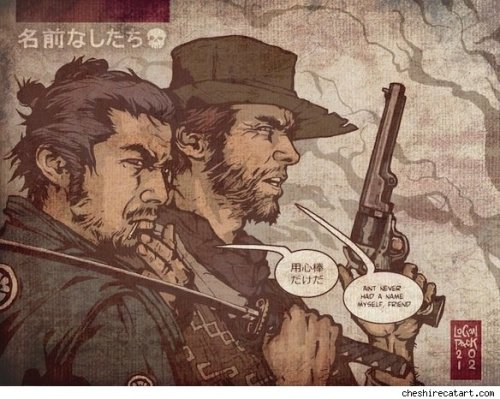I have for years thought that I needed to catch up with The
Outlaw Josey Wales... but it turns out I have seen it. I don't know how long
ago, but I distinctly remembered almost every scene, and knew the general
outline of what was going to happen next. I also remembered that I didn't think
much of the film, that it seemed a pretty standard Western story (which
probably meant that I saw it when I was much younger as well, as this story
isn't especially common.)
I have to say that I'm really glad that I watched it again
because it has certainly gone up in my estimation in this viewing.
Clint plays the title character who finds himself in the middle
of the Civil War after a Union troop destroys his house, rapes and kidnaps his
wife and kills his son. When the war finishes and he finds himself on the
losing side, he cannot pledge allegiance to the Union, and finds himself an
outlaw, being chased across the land, from Missouri to Texas.
But my question about this film comes in the short
introduction that Clint, in his current aged appearance, makes to the film. He
says that it is "about the destructiveness of war"... which puzzled
me. There is a brief war montage at the beginning of the film, but almost all
of the film takes place in the aftermath of the Civil War. I believe the
director, so it caused me to reconsider what this film was really about.
Suppose it was all about war, how would it be read?
First, the situation comes as a result of war. Clint's
family is killed and he is thirsty for revenge because a group of men was given
licence to ravage uncontrollably, which really would happen only in wartime.
The betrayal of his men comes from the hatred and distrust of even honorable
men that occurs in wartime. Clint is declared an outlaw because he refused to
put the war behind him. Everywhere he went the bodies stacked up because no
matter where he was the war followed him. Even though many had put the war
behind them, he didn't because his thirst for revenge hadn't been fulfilled,
and there were many who wanted to take revenge on him. The large price on his
head was also an aftermath of the war, in which war crimes were overlooked (or
even rewarded with promotions). Because of this continuing war, Clint could
never settle down, never relax, never create a new homestead.
There are signs of peace between individuals. Hatreds can be
set aside between individuals, and battles can be agreed to be avoided between
individual leaders. But this cannot happen, it is agreed, between governments.
Governments must fight and kill the innocent because they have no choice.
[spoiler]At the end, the man whom Clint thought betrayed him declared his
peace, saying, "The war is over." But this is only because the
government's official records declared the outlaw dead. War can only end in the
face of a lie. [/spoiler]
How does this fit into Clint Eastwood's filmography and
politics? I think it is clear that Clint supports the individual right of
violence, but opposes any institutional violence. Institutional violence kills
too many innocents, ruins the independent nuclear family/homestead ideal, and
destroys lives long past the war's cessation. Clint is close to a libertarian,
seeing government as a largely malevolent force, creating a context in which
the individual is forced to be an outlaw to survive.
While the ethics and politics I might question (especially
any support of redemptive violence), I think that this film presents such an
ideal in a marvelous way. It is often subtle, and the brutality of the story is
often softened by the beauty of the landscape, not unlike The Searchers. The
cinematography and pacing is certainly reflective of Leone's influence,
although Eastwood doesn't have the patience of Leone to really develop an
intense suspense. This film is about as close as I've seen Eastwood get to an
epic film, in both theme and size of landscape.




